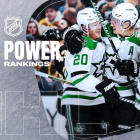The Vegas Golden Knights are out.
A year after making an incredible, improbable run to the Stanley Cup Final in their inaugural season, the Knights are one-and-done in this postseason's bracket. It was a dramatic fall, too, as Vegas blew a 3-1 series lead and a 3-0 lead in Game 7 against the Sharks, who ultimately came out on top with a series-clinching overtime goal off the stick of Barclay Goodrow.
So how did Vegas let this series slip out of their hands? Let's break it down.
The power play
Obviously we have to start here. Not the power play as a whole, but the power play -- the one in Game 7 that changed everything.
You probably already know the story but, if not, you can brush up here. In short, the Golden Knights were up 3-0 in the third period of Game 7 and seemingly on their way to cruising to a series win when a controversial cross-checking call gave the Sharks a five-minute power play and paved the way for them to climb back into the game.
To be frank: This call was terrible. Cody Eakin's cross-check to Pavelski's chest wasn't overly malicious. In fact, it's a fairly common infraction (especially in the playoffs) and one that rarely even gets whistled. If you're going to call a penalty on that, it's a minor at most.
But the average infraction had an unfortunate result, as Pavelski lost his balance and took a hard, awkward fall that led to him bleeding from his head. Officials either A) missed what happened and wrongly guessed that Pavelski was checked in the face, or B) decided to discipline based on the severity of an indirect result rather than the severity of the infraction itself.
Either way, it was an extremely poor decision that ended up having a massive impact on the outcome of the series, and that's always unfortunate to see. There's no guarantee that Vegas would have won the series had they gotten a more fair ruling here, but things were certainly trending that way.
The penalty kill
Okay, now that we've addressed the call, let's address Vegas' response to the call. As unfortunate as the ruling was, the Golden Knights were still up by three goals at the time of the incident. That's a lot of runway to work with if you keep your composure.
Unfortunately for Vegas, they came completely unraveled after the penalty call and proceeded to allow four straight power play goals in less than four minutes, not only giving San Jose full momentum but the lead as well. That can't happen. I know killing off a major penalty isn't easy -- especially against a talented PP unit like the Sharks' -- but you just can't allow four power play goals in the third period of a Game 7. Great teams don't let that happen.
The @SanJoseSharks have taken the lead late in the third.
— NHL on NBC (@NHLonNBCSports) April 24, 2019
This game is crazy.
Watch more here: https://t.co/Cxfh9sXayp pic.twitter.com/49AMqrbD61
Vegas failed to collect itself after the incident or after each of the ensuing goals, and as a result the situation quickly snowballed. Again, they shouldn't have been put in that position in the first place, but it's tough to say that the officiating completely stole this game from them when they had such a large cushion.
If the refs put the Sharks on the road to victory, the Knights let them accelerate ahead by pulling off to the shoulder.
Martin Jones? Martin Jones
Considering the Sharks had the league's worst goaltending this regular season, I didn't expect Martin Jones to be a reason why the Golden Knights would be going home so early. And oddly enough, had Vegas ultimately won in Game 7, Jones also probably would have been listed as a reason the Sharks were eliminated. That's just how inconsistent he was during this series.
At points he looked like the goaltender that finished the season with an .896 save percentage -- he gave up a number of bad goals and was pulled twice in the series.But at other points he looked like the goalie who led the Sharks to the Stanley Cup Final three years ago.
In the final three games of the series (all potential elimination games for the Sharks) he stopped 122 of 129 shots (.946 save percentage) to help keep his team alive, including 58-save performance in the Sharks' Game 6 double-overtime win.
Golden Knights' most dominant line went quiet
Vegas' biggest strength is their top-six, and they were very, very good for a good portion of this series. The "second line" trio of Mark Stone, Paul Stastny and Max Pacioretty was especially dominant at points -- racking up 13 goals and 31 points collectively.
They took over the series in Games 2-4 and it's not a coincidence that those were the three games that Vegas won. But that line was held without a point and was a minus contributor in Games 5 and 6, and it's not a coincidence that those two games helped the Sharks pull even in the series.
Tomas Hertl
The Sharks had several guys worth acknowledging but the one guy I'm going to highlight here is Hertl. He had six goals in the series, four of them coming in the final three games of the series. After a Game 5 performance that saw him score twice, he used his postgame interview to guarantee that the Sharks would force a Game 7.
Tomas Hertl, extremely happy child, guarantees a Game 7 pic.twitter.com/C1fBxfn9wn
— Pete Blackburn (@PeteBlackburn) April 19, 2019
Not only did that promise come true, but Hertl personally made it happen himself with the double-overtime game-winner in Game 6, which came shorthanded.
He also added one of the power play goals during the Sharks' comeback in Game 7. He seems to be a spark plug for this Sharks team, and he came up big and lit a fire under this team when they needed him the most.






















